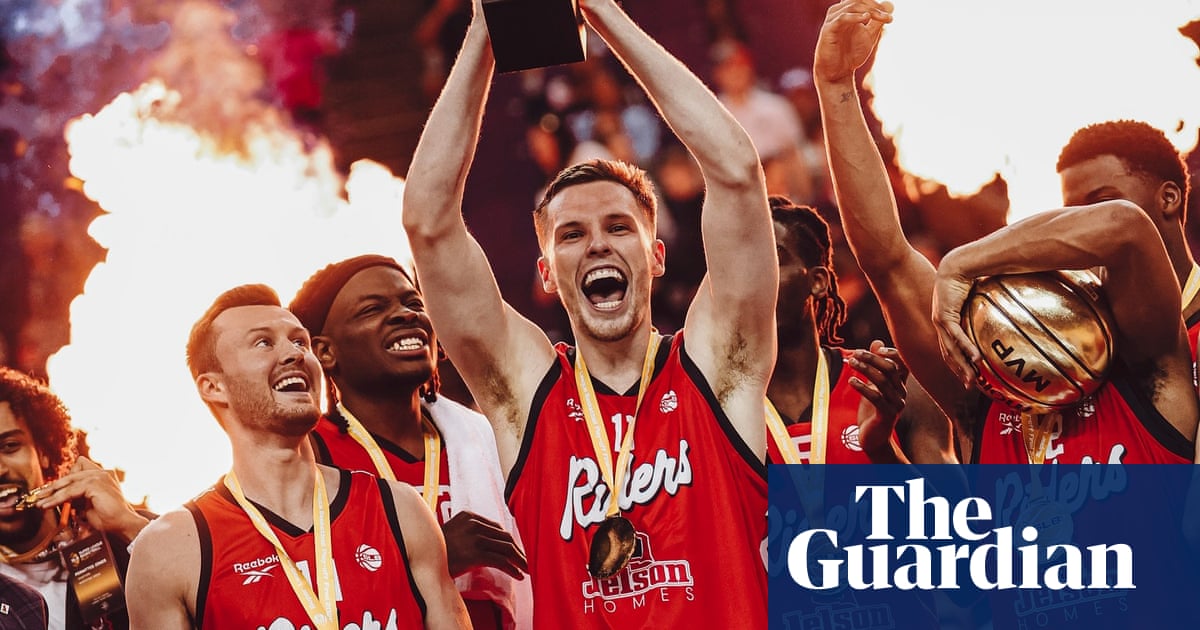The machinations over football’s European Super League feel like a distant threat compared with the civil war in British basketball between the top-flight clubs and the sport’s governing body.
Leicester Riders claimed a record-equalling seventh Super LeagueBasketballtitle in the final on Sunday against Newcastle Eagles at a packed O2 Arena, but it is unclear whether the league will even take place next season.
The Championship game was overshadowed by the announcement last week of more detail surrounding the British Basketball Federation’s awarding of a 15-year licence to operate a new Great Britain Basketball League to an American consortium led by the former NBA executive Marshall Glickman.
Glickman’s group, which is backed by the Seattle-based private equity company West River Group and several unknown athlete investors, has committed to a £15m upfront payment to cover operating costs for the first two years of the new league, which will launch for the 2026-27 season.
As a former president of Portland Trailblazers and acting chief executive of EuroLeague Basketball, Glickman has considerable pedigree but also a significant problem: the existing clubs are refusing to join.
As reported previously by the Guardian thenine existing SLB clubs are threatening legal actionagainst the BBF over allegations that the tender process was unlawful and have asked the sports minister, Stephanie Peacock, to investigate, while the governing body denies any wrongdoing.
In footballing terms, the situation is akin to the Football Association setting up a new domestic league without the Premier League clubs. The BBF has triggered a 12-month break clause in the three-year licence it awarded the SLB clubs to run the league last summer; with the GBBL not due to start until 2026‑27, arrangements for next season are unclear, not helped bygrowing acrimony on both sides.
In his first interview since signing the licence, Glickman, who will be aided in an advisory capacity by the London 2012 Games bid chief Sir Keith Mills, says he would like the SLB clubs to join, but is bullish about the league’s prospects if they do not.
“We have reached out to the SLB clubs multiple times going back months,” he says. “They have not been willing to engage. We would really like them to engage, but I don’t know if and when they will. There have been written responses that basically said: ‘We’re not interested in talking to you.’
“I don’t understand what the clubs are complaining about. They signed the licence. They knew what they were signing. Everybody understood that the federation was going to put a tender out for a long-term licensee.
“We looked at the tender and, frankly, we thought that they were also going to bid. We were quite surprised when they did not. What motivated them to not bid for the tender and then complain about the process is hard to understand.”
Glickman’s group is planning a major expansion with or without the existing clubs, with an immediate increase from the nine clubs to a 10-team competition in 2026 followed by further growth to 12 and then 14 clubs. Talks are under way with potential operators of new clubs in Leeds, Liverpool, Birmingham, Southampton, Cardiff and Edinburgh, while there will also be a strong presence in London and Manchester.
“I don’t think players will be a problem,” Glickman says.
“I mean, there’s a lot of players, so I’m not concerned about players. And there are a lot of venues. There’s a lot of markets that do not have teams today, and there are certain markets that may have teams but there could be other teams. There are multiple open venues that we’re in touch with. I would anticipate that ultimately, we will have a mix of SLB clubs and expansion clubs.”
Sign up toThe Recap
The best of our sports journalism from the past seven days and a heads-up on the weekend’s action
after newsletter promotion
A major part of Glickman’s strategy is to secure a terrestrial broadcast partner, and there are hopes the BBC will be interested in taking at least one game a week given the data which shows basketball’s growing popularity among younger, diverse audiences.
“We want a certain number of games on free-to-air television,” Glickman says. “We think that’s really important, to make it as accessible as possible to the most number of people.
“We all know what’s happening right now in sports – it’s paywall, paywall, paywall. I think I have 12 different apps on my television. And at the end of the month I go: ‘Boy, I just spent $500 in order to watch live sports!’
“So live sports is something that’s really compelling. And I think over time, we can really begin to build an audience and increase the relevance and popularity of basketball in Great Britain.”
The format of the competition will also change, with the number of regular season matches reduced and the playoffs slimmed down, but several extra tournaments added to the league campaign.
“They just did the playoffs – there are nine teams and eight teams made the playoffs,” Glickman says. “We don’t agree with that. In the new league, one and two will reach the playoffs, then three to six play a tournament in one weekend to decide who joins them.
“And we will stage a series of mini-tournaments throughout the season in big arenas, with points available for the league standings. So one weekend it’s Birmingham, the next one it’s Manchester, the next time it’s Liverpool. In that weekend, they play a tournament over two days and those points roll over into the table.
“We’ll turn those big weekends into a communal gathering. I’m not British so you’ll have to tell me if I’m full of crap here, but Brits like big events and like to hang out. That’s what the whole pub thing is all about, right? It’s about hanging out. And it’s about gathering. So we intend to create the best hangout in Great Britain on those weekends.”
